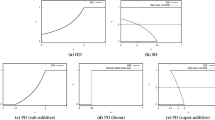Abstract
Random matching models with infinite populations present formal difficulties due to the lack of a law of large numbers for a continuum of random variables. In a previous paper (Alós-Ferrer, 1999), random matching processes for a continuum of agents were studied, proving their existence. The present work extends the analysis to the case of several populations, which includes general equilibrium buyers–sellers models, and evolutionary models with underlying asymmetric games.
Similar content being viewed by others
References
C. Alós-Ferrer, Individual randomness in economic models with a continuum of agents, Working Paper 9807, Department of Economics, University of Vienna (1998).
C. Alós-Ferrer, Dynamical systems with a continuum of randomly matched agents, Journal of Economic Theory 86 (1999) 245-267.
R.T. Boylan, Laws of large numbers for dynamical systems with randomly matched individuals, Journal of Economic Theory 57 (1992) 473-504.
M. Feldman and C. Gilles, An expository note on individual risk without aggregate uncertainty, Journal of Economic Theory 35 (1985) 26-32.
P.R. Halmos, Measure Theory (Van Nostrand, New York, 1950).
J. Nash, Non-cooperative games, Dissertation at Princeton University (1950).
J. Neveu, Bases Mathématiques du Calcul des Probabilités, 2nd ed. (Masson, Paris, 1980).
M. Peters, Ex ante price offers in matching games non-steady states, Econometrica 59 (1991) 1425-1454.
M. Peters, On the equivalence of Walrasian and non-Walrasian equilibria in contract markets: The case of complete contracts, Review of Economic Studies 64 (1997) 241-264.
J.W. Weibull, Evolutionary Game Theory (MIT Press, Cambridge, MA, 1995).
Author information
Authors and Affiliations
Rights and permissions
About this article
Cite this article
Alós-Ferrer, C. Random Matching of Several Infinite Populations. Annals of Operations Research 114, 33–38 (2002). https://doi.org/10.1023/A:1021045732513
Issue Date:
DOI: https://doi.org/10.1023/A:1021045732513




